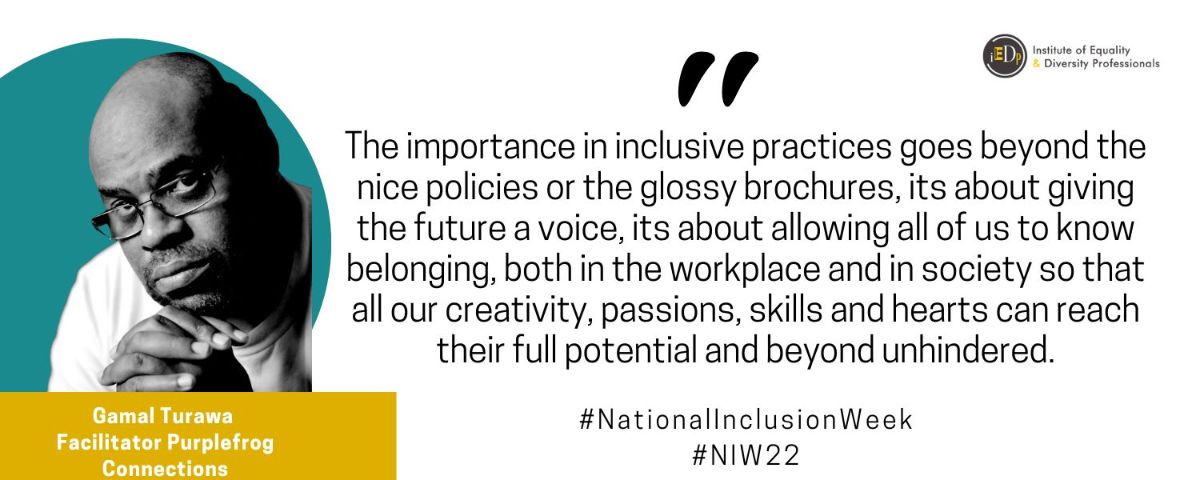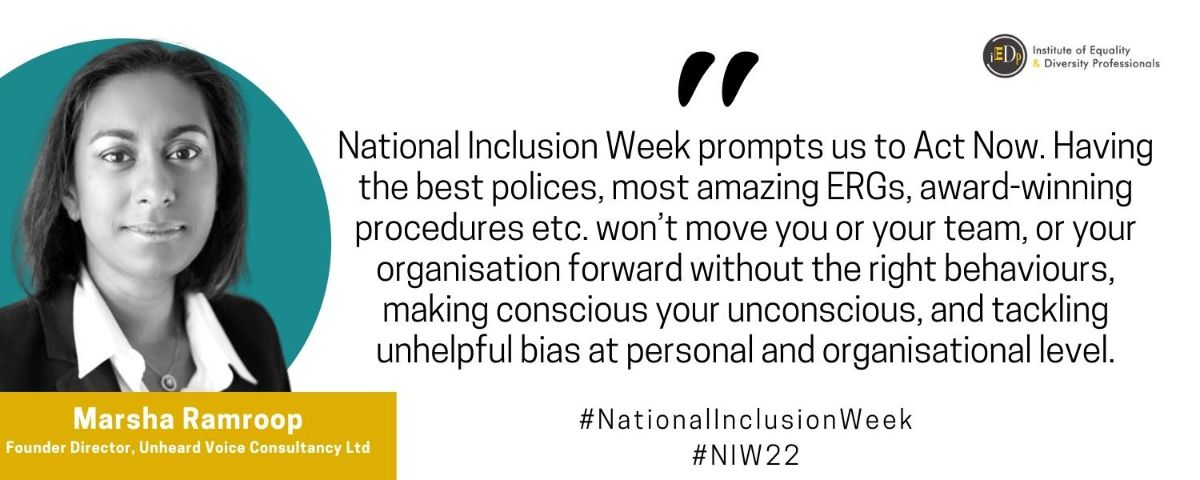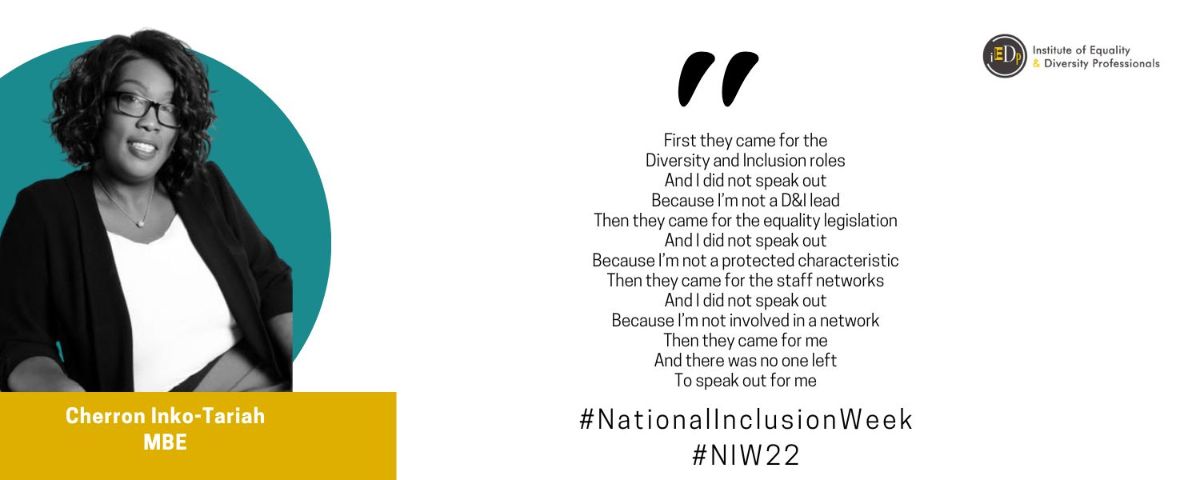
A few words from Gamal Turawa...

Growing up as a young Black Gay boy in both the UK and Nigeria in the 1970s and 80s I didn’t see any role models that I could relate to or mentors to guide or show me that I was included in society. I couldn’t hide my colour, however I did all I could to hide and suppress my sexual orientation because of the of the blatant and unrestrained homophobia that was around me and I was in that place until my late 30s and am even as I now approach my 60s I am still unravelling the legacy of that suppression. However now I am very visible and use my story to help others to find theirs. I want to be that person in the room whom I needed when I was that scared Black Gay boy.
National inclusion week for me is about celebrating ways in which those of us that are able to can be a beacon for those that need someone to give them confidence, something to aim for and above all give them hope in their own future.
The importance in inclusive practices goes beyond the nice policies or the glossy brochures, its about giving the future a voice, its about allowing all of us to know belonging, both in the workplace and in society so that all our creativity, passions, skills and hearts can reach their full potential and beyond unhindered. So don’t make National Inclusion week just a week, make it a way of being so that it becomes the fertiliser that grows a brighter world for us all.
Gamal Turawa
Facilitator Purplefrog Connections
A few words from Caroline Turner...

The current landscape in the UK for Neurodiversity is in a period of flux and uncertainty. Organisations are reacting to unprecedented disclosure of unseen disabilities, attempting to understand their obligations and decide who should drive the portfolio. This uncertainty (and often confusion) provides opportunity for positive challenge and change but where do you start?.
5 years ago organisations were choosing not to engage in the Neurodiversity conversation, it wasn’t the right time or it wasn’t the right ‘focus’. Now, and for some time, it has been accepted as a ‘need to have’ but how do you start, how much does it cost and who should you go to for support?
- Identify resources – don’t just rely on staff associations to drive this alongside their ‘day to day’
- Ring fence budgets – quality training and consultancy costs money, relying on the good will of charities does not provide sustainable change
- Agree a timeline – what do you want to have achieved in your organisation in 6 months, 2 years, 5 years?
- Find quality partners – An experienced Neurodiversity company has had years of assisting organisations to build their portfolios, tap into their knowledge and expertise
- Agree stakeholders – identify who should be around the table, Occupational health, HR, Staff associations, Corporate communications?
- Don’t do a launch – big launches make for big promises, the most successful initiatives have developed organically and gained momentum with time and commitment
Getting started is the hard part, doing something can often make for uncomfortable conversations and challenge. However we see everyday the impact that an organisation can have on neurodivergent individuals lifestyle, progression, well-being – the view of themselves. There is no ‘business case’ to prove anymore, just the answering of the question “Do you want to be relevant?”
Caroline Turner
A few words from Barry Boffy...

A few words from Marsha Ramroop...

I’m concerned about the number of companies still expecting staff networks, volunteer groups and hobbyists to fix the issues of racism, discrimination and social injustice in their organisations.
It’s not their responsibility; that’s the job of leadership. Staff networks and Employee Resource Groups (ERGs) are there to raise issues, provide insights, and celebrate identities. It’s not for the discriminated against to mitigate people’s bias.
If you actually want Equity, Diversity and Inclusion (EDI) efforts to succeed in your company you need these six elements; I say, you need to STREAM© your EDI:-
Support, Time, Resource, Effort, Agency, Money.
Support: Leadership demonstrative and vocal about EDI in thought, behaviour and practice;
This means:
- Recognising diversity: valuing all people intrinsically, individually and as groups, appreciating how different diversity dimensions intersect, and acknowledging that demographic and other personal characteristics can possibly be protected by law and regulation.
- Governing effectively: exemplifying and promoting leadership commitment to EDI through the use of inclusive organisational governance systems, policies, processes, practices and operations.
- Acting accountably: acting in an ethical and socially responsible manner, promoting productive employment and decent work for all.
- Working inclusively: enabling and developing an accessible and respectful workplace environment that fosters inclusion and a sense of belonging, for those who wish to belong at work.
- Communicating inclusively: recognising and responding to the needs of people who access, understand and relate to communications in different ways.
- Advocating and championing EDI: actively influencing and promoting inclusive organisational practices and stakeholder relationships.
- Time: People given the opportunity to change and EDI team given the time to reflect and support comprehensively;
- Resource: Facilities made available to allow for the full implementation of inclusive changes;
- Effort: Proper expertise and enough people on the EDI team to manage the workload effectively;
- Agency: Most senior EDI colleague to have the unmediated ear of the CEO and full influencing access to the Executive and Board/ decision making leaders;
- Money: Budget expectations met and sustained as the EDI work grows and develops.
To get a proper return, requires proper investment.
National Inclusion Week prompts us to Act Now. Having the best polices, most amazing ERGs, award-winning procedures etc. won’t move you or your team, or your organisation forward without the right behaviours, making conscious your unconscious, and tackling unhelpful bias at personal and organisational level.
The framework of behaviours proven to create inclusion, and the prompt the STREAMing of EDI, is Cultural Intelligence (CQ), the capability to work and relate effectively with those different to you.
Working on your CQ is a step you can take now, to start to make a difference and be the change you want to see.
(Part of his blog was first published on LinkedIn on 28th April 2022. STREAM as an acronym for prerequisites in organisational EDI is Marsha Ramroop’s original work, and the author asserts copyright over the term in this usage).
Marsha Ramroop
A few words from Cherron Inko-Tariah...

I tweaked the words of the poem ‘First they came’ by Martin Niemoller to reflect the impact.
The Rude Awakening
First they came for the
Diversity and Inclusion roles
And I did not speak out
Because I’m not a D&I lead
Then they came for the equality legislation
And I did not speak out
Because I’m not a protected characteristic
Then they came for the staff networks
And I did not speak out
Because I’m not involved in a network
Then they came for me
And there was no one left
To speak out for me
Cherron Inko-Tariah
A few words from Tony McCaffrey...

It has been 78 years since the UK first legislated to close the Disability Employment Gap. Seventy-eight years! Yet, we still have employment rates for people with disabilities hovering just above 50% compared to just over 80% for non-Disabled people. The mid 1990s saw the introduction of the Disability Discrimination Act, which was then superseded by the Equality Act in 2010. Clearly, legislation isn’t having the desired affect. So in the spirit of the 2022 theme for National Inclusion Week, employers must recognise that “Time to Act: The Power of Now” isn’t just a clever slogan that that requires a week-long performative nod. Instead, it’s a rallying cry. With continued talent shortages affecting most sectors of the labour market, now is time to take action to leverage the enormous skills and value that an increase in employment for Disabled People will bring to businesses, the economy and society as a whole.
Tony McCaffrey

